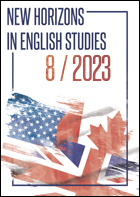Hair as a Form of Resistance in Chimamanda Ngozi Adichie’s Americanah
Hair as a Form of Resistance in Chimamanda Ngozi Adichie’s Americanah
Author(s): Karolina KmitaSubject(s): Other Language Literature, British Literature, American Literature
Published by: Wydawnictwo Naukowe Uniwersytetu Marii Curie-Sklodowskiej
Keywords: gender; hair; resistance; postcolonialism;
Summary/Abstract: The aim of this paper is to establish the hair salon in Chimamanda Ngozi Adichie’s Americanah (2013) as a microcosm of social interactions, which contributes to the transfigurations of self-representation within postcolonial discourse. The novel's main character, Ifemelu, grows up in the shadow of her mother's hair. When she comes to the United States as a student, she starts to straighten her hair in order to appear professional. The moment of epiphany occurs when her hair starts to fall out and she decides to go from relaxed to natural hair. Her decision to preserve her natural hair is often perceived as a form of resistance to Western standards of beauty. Nevertheless, the perspectives of other women present at the hair salon still remain disentangled, as they expose the gendered, ethnic, and socioeconomic divides that lead to discordant encounters. Hence, for that reason, the novel illustrates the necessity of intersectional analysis. The lengthy process of hair braiding, however, makes it an ideal location for ironing out any discrepancies and achieving a consensus between the female interlocutors who come from various backgrounds within the African ethnography. Drawing on the Bakhtinian concept of heteroglossia, Adichie’s Americanah can be perceived as a form of transgressional writing which offers a broader nexus of polyvocal forms of self-representation.
Journal: New Horizons in English Studies
- Issue Year: 8/2023
- Issue No: 1
- Page Range: 119-129
- Page Count: 11
- Language: English

